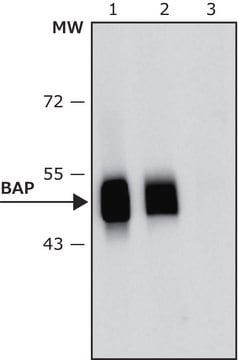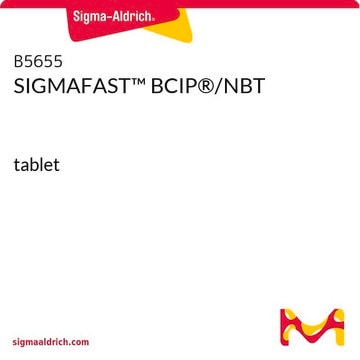B6804
Monoclonal Anti-Bacterial Alkaline Phosphatase (BAP, PhoA) antibody produced in mouse
clone BAP-77, ascites fluid
Sinonimo/i:
Monoclonal Anti-Phosphatase, Alkaline, bacterial
About This Item
Prodotti consigliati
Origine biologica
mouse
Livello qualitativo
Coniugato
alkaline phosphatase conjugate
Forma dell’anticorpo
ascites fluid
Tipo di anticorpo
primary antibodies
Clone
BAP-77, monoclonal
PM
antigen ~50 kDa
Reattività contro le specie
bacteria
tecniche
indirect ELISA: suitable
western blot: 1:20,000 using purified Escherichia coli BAP
Isotipo
IgG1
Condizioni di spedizione
dry ice
Temperatura di conservazione
−20°C
modifica post-traduzionali bersaglio
unmodified
Categorie correlate
Descrizione generale
Immunogeno
Applicazioni
Azioni biochim/fisiol
Esclusione di responsabilità
Not finding the right product?
Try our Motore di ricerca dei prodotti.
Codice della classe di stoccaggio
12 - Non Combustible Liquids
Classe di pericolosità dell'acqua (WGK)
WGK 1
Punto d’infiammabilità (°F)
Not applicable
Punto d’infiammabilità (°C)
Not applicable
Certificati d'analisi (COA)
Cerca il Certificati d'analisi (COA) digitando il numero di lotto/batch corrispondente. I numeri di lotto o di batch sono stampati sull'etichetta dei prodotti dopo la parola ‘Lotto’ o ‘Batch’.
Possiedi già questo prodotto?
I documenti relativi ai prodotti acquistati recentemente sono disponibili nell’Archivio dei documenti.
Il team dei nostri ricercatori vanta grande esperienza in tutte le aree della ricerca quali Life Science, scienza dei materiali, sintesi chimica, cromatografia, discipline analitiche, ecc..
Contatta l'Assistenza Tecnica.







